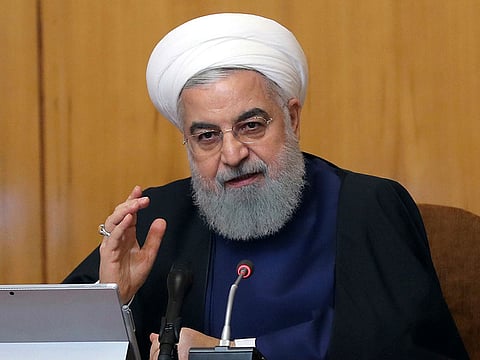Rouhani seeks more powers amid ‘economic war’
Iran has quadrupled production of enriched uranium as tensions escalate

Tehran - Iranian President Hassan Rouhani said his government needs more powers to push back against the “economic war” the US is waging, while vowing his nation will stand fast against the Trump administration’s campaign rather than submit to its demands.
During Iran’s war with Iraq in the 1980s, a wartime supreme council was set up and “held all powers, and even the parliament and the judiciary did not intervene,” Rouhani told a gathering of clerics, according to the official Islamic Republic News Agency.
Today Iran “is in a state of economic war” and “we need the same type of power,” he said, referring to US sanctions directed against the country’s vital oil industry and other targets.
Tensions in the Gulf have heightened since the US stopped granting waivers to buyers of Iranian oil early this month, tightening sanctions slapped on Tehran after President Donald Trump exited an international nuclear deal a year ago.
The US hastened the deployment of an aircraft carrier to the Gulf, dispatched bomber jets and withdrew some diplomatic personnel from Iraq, citing unspecified threats to American forces or commercial shipping by Iran or its proxies in the Middle East.
Al Houthis backed by Iran have claimed responsibility for a drone attack this month on two pumping stations along Saudi Arabia’s cross-country oil pipeline and on a southern Saudi airport, and Saudi Arabian and other oil tankers were reported sabotaged as they approached the strategic Strait of Hormuz waterway.
With an economic crisis looming, Iran threatened to gradually withdraw from the agreement unless the remaining parties find a way to ease its pain. On Monday, it said it accelerated the rate at which it’s enriching low-grade uranium fourfold, though that alone doesn’t mean it is violating limits agreed under the 2015 deal.
The US has requested talks with Iran on several occasions, but Rouhani said that while he advocates diplomacy, current conditions call for “resistance,” not negotiations.
Sign up for the Daily Briefing
Get the latest news and updates straight to your inbox



